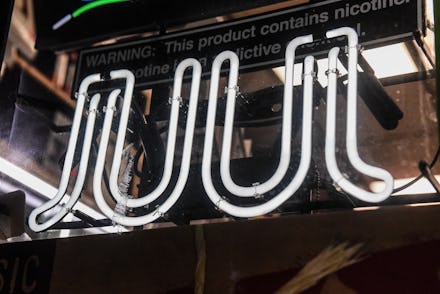Juul will pay nearly half a billion to settle a teen vaping investigation
According to an inquiry by 33 states and Puerto Rico, Juul’s marketing worked a little too well.

Over the past couple of years, Juul Labs has found itself knee-deep in several tumultuous battles over what some say were shady marketing tactics that targeted teens and got them hooked on nicotine. Yesterday, Juul Labs agreed to pay $440 million to settle a scathing two-year investigation brought against them by 33 states and Puerto Rico, per ABC News.
In June, the FDA ordered Juul to take to take its beloved e-cigarettes off the market, but the company has been fighting tooth and vape to keep selling its products in the United States. The latest settlement included clauses intended to hinder Juul’s ability to market towards teens — including a restriction on having anyone under the age of 35 in its advertising — and pushed for the company to be more transparent about how much nicotine its products actually contain, per the New York Times. Juul Labs still admitted no wrongdoing, but said it was paying the settlement anyway in an effort to scrub its image.
Among other things, the investigation claimed that Juul had marketed to younger people by doing things that any other company would do, like hiring hot young models and throwing FOMO-inducing parties where people got free product, per the Times. Juul’s allure was so powerful among young people that the company’s name itself became synonymous with vaping and its products continue to be a ubiquitous part of Gen-Z culture; everyone from Post Malone to Doja Cat has been caught Juuling, although the latter is regretting that now.
This settlement is just the tip of Juul’s many woes. Not only is their place in the American market on unsure footing, but there are nine other lawsuits by other states waiting for them, as well as one giant action in California made up of thousands of lawsuits by individuals and local governments, according to the Times. If Juul manages to survive by some miraculous feat, it will not come out of all of this unscathed. The company will no longer look like the promising e-cigarette brand that wooed us circa 2015. Instead, it will be a hollowed-out and flavorless version of itself marketed primarily as a tool to help older heavy smokers wean themselves off cigarettes — a decidedly less sexy endeavor.